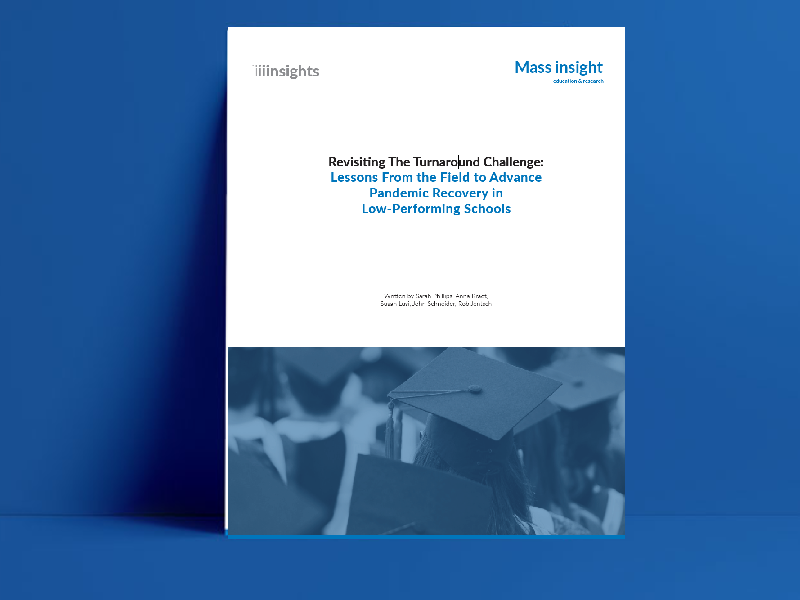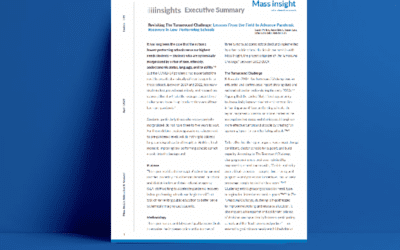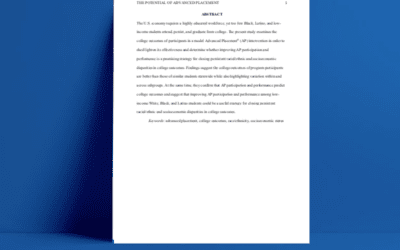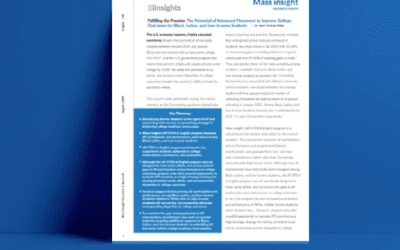In this op-ed for Globe Rhode Island, Mass Insight's Susan Lusi writes that education in Providence is in crisis and asks Rhode Islanders to support a special commission’s recommendations to move the city's schools forward. Read the full op-ed from The Boston Globe...
Revisiting The Turnaround Challenge: Lessons From the Field to Advance Pandemic Recovery in Low-Performing Schools
It has long been the case that the nation’s lowest performing schools serve our highest needs students — students who are systemically marginalized by virtue of race, ethnicity, socioeconomic status, language, and/or ability. But the COVID-19 pandemic has exacerbated the need to provide dramatically different supports to these schools. Between 2019 and 2022, too many students lost ground academically, and researchers estimate that it will take the average student three to five years to catch up to where they would have been pre-pandemic. To download the Executive Summary highlighting key takeaways, click here.
Key Takeaways from this Insights Paper:
- The extent to which a district has established the conditions (time, people, money, and program) for school transformation seems to matter more than the strategies by which conditions change occurs.
- Those working to transform low-performing schools should focus on strategies for improving conditions that have the greatest likelihood of success in their local context.
- In addition to time, people, money, and program, district and zone climate should be added to the list of critical conditions to be leveraged or improved.
- The benefits of clustering appear related to the use of a spiderweb network model and the establishment of a zone office with the structure and authority to offer streamlined central office support/buffer zone schools.
- While resources may significantly improve student outcomes in the short-term, additional resources must be combined with other capacity-building strategies if they are to affect long-term student outcomes in low-performing schools.
- School and district leaders and SEA staff would do well to establish a clear focus and align their capacity building efforts to that focus.
Download the Resource
Lessons From the Field to Advance Pandemic Recovery in Low-Performing Schools

Recent Posts
An Interview with Mass Insight AP Students and their Teacher
https://youtu.be/mQTeW8-sX40 We sat down with two Mass Insight AP STEM & English Program students, Ben and Chris-Ander, and their teacher, William Pellegrino, to hear about their educational journeys, their experiences in AP classes and as vocational students, and...
Mass Insight Education & Research names Andrea Wolfe President & CEO
Ms. Wolfe succeeds Dr. Susan Lusi, who will step down in June after leading the national nonprofit for eight years. April 18, 2024 – The Board of Directors of Mass Insight Education & Research has named Andrea Wolfe as the next President & CEO of the...
You may also like
Executive Summary: Revisiting The Turnaround Challenge
Our report, Revisiting The Turnaround Challenge: Lessons From the Field to Advance Pandemic Recovery in Low-Performing Schools, takes a look back at the Zone model presented in our seminal 2007 report, The Turnaround Challenge, and uses three anonymous district case...
The Potential of Advanced Placement to Improve College Outcomes and Narrow Racial/Ethnic and Socioeconomic Disparities
The Potential of Advanced Placement to Improve College Outcomes and Narrow Racial/Ethnic and Socioeconomic Disparities by Dr. Sarah Phillips and Brett Lane Published online in the June 2021 Journal of Advanced Academics, this paper describes how improving AP...
Fulfilling the Promise: The Potential of Advanced Placement to Improve College Outcomes for Black, Latino, and Low-Income Students
The U.S. economy requires a highly educated workforce. Ninety nine percent of all new jobs created between January 2010 and January 2016 went to workers with at least some college education, and the U.S. government projects that nearly forty percent of jobs will...



